The Prequel and The Bowtie
This should do it for now -- a bit on the prequel, and bowtie musings.
Nom nom

We start in a Tea Room, and the Doctor's about to lay into a nice, tasty crumpet, all jellied up and ready to go, but it never reaches his gob -- for there's a Headless Monk on the other side of a very long table. And at this point we haven't had any dialogue yet, but we've already invoked several images. The Headless Monks, of course, featured prominently in A Good Man, and the crumpet popped up just recently in Pond Life 1, but the Tea Room is new, and tea has a mythological dimension to it. (For anyone who wants to follow along, I consult both the Penguin Dictionary of Symbols and Tachen's The Book of Symbols: Reflections on Archetypal Images, which has a particularly Jungian slant to it.)
According to the Penguin Dictionary of Symbols:
An aesthetic, however perfect, is not the sole source of the wonderful Japanese tea ceremony, although economy of setting, gesture and means might make it seem an inimitable cult of the beautiful. However, the Taoists say that the first tea ceremony was Yin-hi's offering of a cup to Lao Tzu when the latter presented him with the Tao Te Ching. The disciples of Zen add that the first tea-pot sprang from the Bodhidharma's eye-lids. He cut them off and cast them aside to prevent drowsiness during meditation and this is why Monks use tea for the same purpose of keeping themselves awake.
Which is all very interesting, considering that there's a Monk delivering a dream-message to the Doctor in an illusory tea-room, not to mention all the Eye imagery and themes of Waking in both the prequel, the episode, and the series as a whole.
So, on to the dialogue. The Monk appears next to the Doctor:
DOCTOR: I don’t think I asked you to sit.
MONK: There is a woman who wants to meet you.
DOCTOR: I’m married.
MONK: Your help is required.
DOCTOR: I don’t discuss my business in public.
MONK: I know.
Sitting is the primary ritual of Zen and Buddhism, and it's in the first line of dialogue, which connects to the Tea Ceremony as described by Penguin. The Monk replies that there's a woman involved, but the Doctor rebuts he's married -- and this serves as a reflection on the Mata Hari scene from Pond Life, where the Doctor's toasting a crumpet before an attempted seduction; if the expression on his face hadn't already made it clear, he's not interested, and yes, he does consider himself married now.
The Monk tempts the Doctor with a plea for help -- "help me" is a phrase repeated over and over again in Moffat's tenure, from the Little Girl in the Library to the Little Girl in the Apollo suit, the Doctor begging River to save her parents, and so on. (For you LOST fans, "help me" is what John Locke hears in Jacob's Cabin after shining a light on an empty chair.)
Finally, this bit of conversation turns when the Monk says, "I know," which is one of many catchphrases employed by Eleven, from The Eleventh Hour to The Wardrobe. As Eleven has dressed as a Monk before, this helps to emphasize the mirroring between the Doctor and the Monk, which Classic fans know goes back to The Time Meddler in Hartnell's run. And with a casual flick of his wrist (reminds me of the Head Clown from The Greatest Show in The Galaxy, it does) the monk makes everyone in the room disappear.If he hadn't gotten the Doctor's attention before, he has it now, for the Doctor leans in with a smile and asks The Question:
DOCTOR: Who are you?
MONK: A messenger.
DOCTOR: Good messenger?
MONK: Darla von Karlson.
Names are always important in the Revival, so let's look at this one. "Darla" means dearest or darling, nothing terribly esoteric there, but "von Karlson" is more loaded -- Karl means "free man," but in a very common sense (the word "churl" has the same derivation) so "Karlson" implies the son or child of man. This is not only ironic (Darla is a puppet, not free) but suggestive: the Dalek/Human puppets are the children of mankind; they are us.
DOCTOR: Never heard of her. (The tearoom disappears.) Where’s the tea room?
MONK: We were never in the tea room.
The Wu-Wo Tea Ceremony encourages the forgetting of knowledge, wealth, and appearance, and its title is an interesting contradcition. "Wu" is the principle of negation, but also of the infinite void. "Wo" is the principle of identity, of self, of being. Having tea in the Wu-Wo fashion is to be and not be at the same time. And this applies to this scene, because they were never having tea in the first place.
DOCTOR: Ohhh, of course. Psychic projection. Someone is sending me a dream message. Well I hope I fell asleep somewhere comfy.
MONK: Do you recognize where you are?
DOCTOR: I remember. How do you hang up on this thing?
MONK: You can’t.
DOCTOR: Oh yeah? And what if I just wake up?
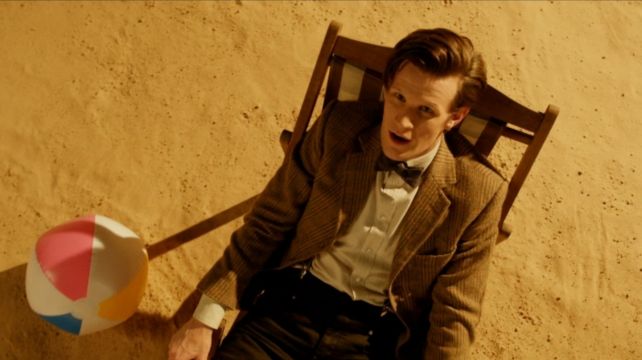
The Doctor imagines waking up, and he wakes up in a Chair, which has been established in many episodes (the Library, the Pandorica, the Wardrobe) as a symbol of Ascension -- and the Doctor even hopes it's "comfy," which invokes the conversation he had with Angel Bob in the Byzantium about "comfy chairs." Furthermore, the Doctor's Chair is on a beach -- he's near a large body of Water, which is "Nature's Mirror."
But the Doctor is deluded. He is not in a Chair on the Beach. He did not "remember" and "wake up," he is still dreaming. Yet the Ascension symbolism still holds, because the very next image takes us to the stars:

MONK: No, doctor. The beach isn’t real either. You are still dreaming. (Circles appear in mid-air.) Space time coordinates. You will meet Darla von Karlson here. Her daughter is in danger and only you can save her. You recognize the planet?
DOCTOR: Yes.
MONK: Say it. Name the planet.
DOCTOR: I will not say that name.
MONK: Say it!
DOCTOR: No!
MONK: Name the planet, name the planet, name the planet...
DOCTOR: (waking up) Skaro.
Naming's very important in Mythology, and it's been a part of the Doctor's mystique since the origin of the show. The "Doctor Who?" joke is all about naming, and identity, but the mystery ultimately isn't about the Doctor's name, or his identity. In Buddhism, the mystery comes when self and not-self are recognized simultaneously. The dissolution of ego is what confers enlightenment.
The Doctor wakes up in his Chair, his real Chair, which hangs below the TARDIS console. The ruins of Skaro, harkening back to the origin of the show, are reflected in his eyes. And in the final image, the TARDIS rockets off into space, to the stars.
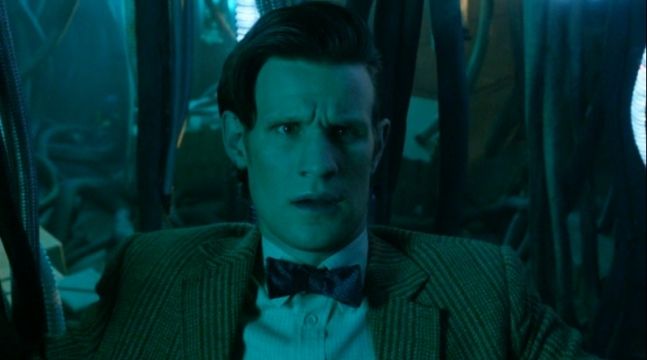
A Brief Interlude
Nothing to lose your head over.
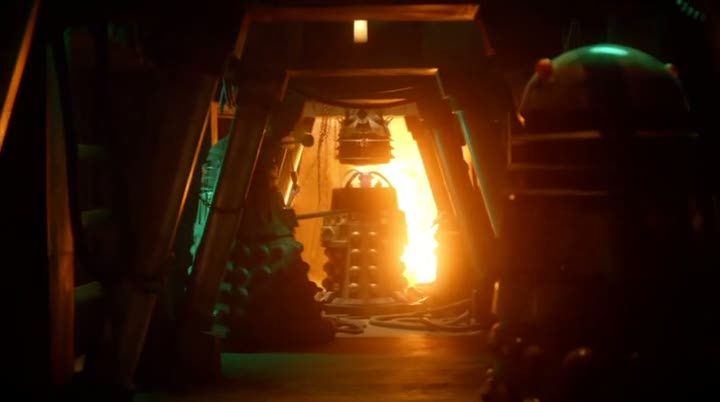
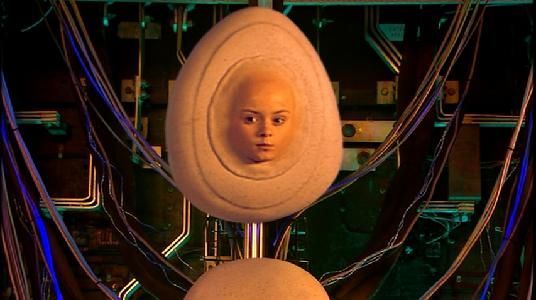
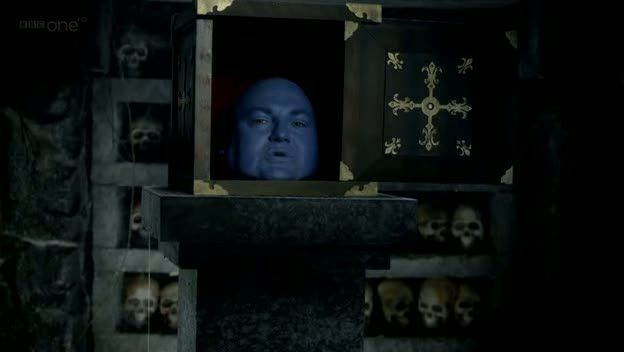
Watch Out That Bowtie!
"Fix" is another key word that pops up over and over again in the current incarnation of Who. Here's the rundown for the Asylum:
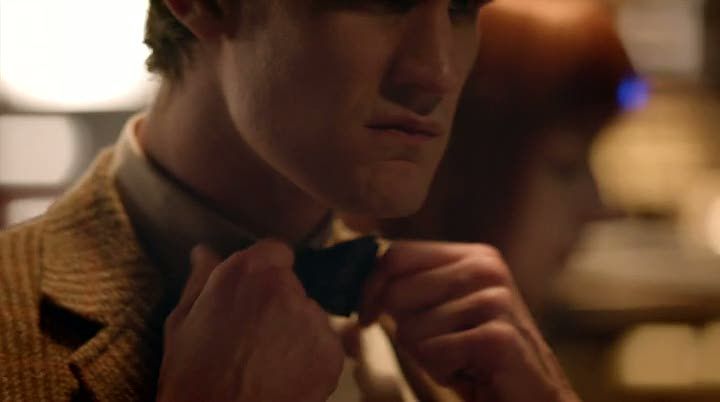
After the title-sequence, and our introduction to Oswin (who's narrating to a recording device) we see the Doctor pacing about the Parliament, and Amy starts narrating the scene (not unlike her narration of the first scene post-title-sequence of The God Complex):
RORY: What's he doing?
AMY: He's chosen the most defensible area in the room, counted all the Daleks, counted all the exits, and now he's calculating the exact distance we're standing apart and starting to worry... Ooh, and look at him, frowning now. Something's wrong with Amy and Rory, and who's gonna fix it? And he straightens his bowtie.
We get a closeup on this action. This juxtaposition comes up again when the "do we have to do this now?" conversation comes up on the other side of Door Seven, when Amy discusses what happens in "life" when the Doctor's not around:
AMY: We split up. What can you do?
DOCTOR: What can I do?
AMY: Nothing. It's not one of those things you can fix, like you fix your bowtie.
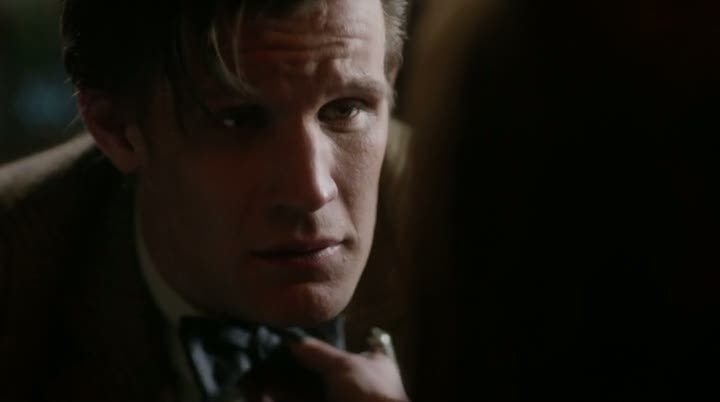
And then she fixes his bowtie, just like River does at the end of Day of the Moon, just before the Doctor kisses her for the first time. Talk about squee!
The bowtie, the bowtie, the bowtie is cool! It's a symbol of the Doctor's engagement with other people, perhaps specifically as the Ponds' household god. He uses the bowtie to make friends with Boy Sardick, all in service to saving Amy and Rory on their honeymoon, but most significantly, he uses the bowtie to marry their daughter!
Here's the kicker -- after he's got Amy and Rory alone on the teleport (an ascension device) they open up let each other know what they really feel:
AMY: I didn't kick you out. I gave you up. Don't you dare talk to me about waiting outside a box, because that is nothing, Rory, nothing compared to giving you up.
RORY: Just give me your arm, let me put this on --
AMY: Get off of me!
RORY: Just give me your arm!
AMY: Don't touch me!(They discover Amy already has a wristband)
RORY: It's the Doctor's. When you were sleeping --
AMY: A Time Lord -- he must -- he doesn't even need it.
RORY: Then why didn't he just tell us?
I love the repetition of the "don't touch me" line from The Girl Who Waited. But we don't have time for that, because right after Rory asks the question, we cut right to this shot:
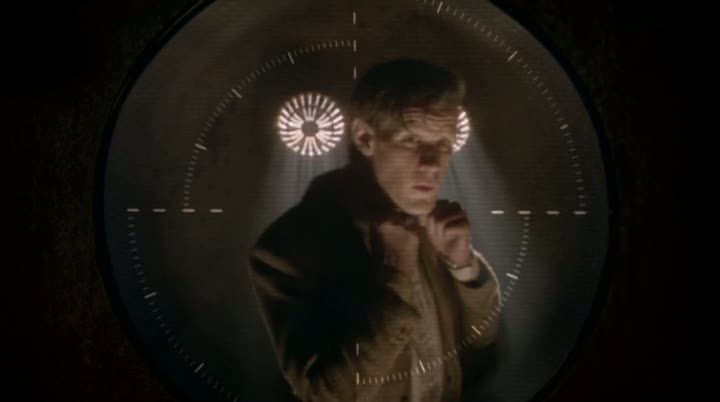
Nom nom

We start in a Tea Room, and the Doctor's about to lay into a nice, tasty crumpet, all jellied up and ready to go, but it never reaches his gob -- for there's a Headless Monk on the other side of a very long table. And at this point we haven't had any dialogue yet, but we've already invoked several images. The Headless Monks, of course, featured prominently in A Good Man, and the crumpet popped up just recently in Pond Life 1, but the Tea Room is new, and tea has a mythological dimension to it. (For anyone who wants to follow along, I consult both the Penguin Dictionary of Symbols and Tachen's The Book of Symbols: Reflections on Archetypal Images, which has a particularly Jungian slant to it.)
According to the Penguin Dictionary of Symbols:
An aesthetic, however perfect, is not the sole source of the wonderful Japanese tea ceremony, although economy of setting, gesture and means might make it seem an inimitable cult of the beautiful. However, the Taoists say that the first tea ceremony was Yin-hi's offering of a cup to Lao Tzu when the latter presented him with the Tao Te Ching. The disciples of Zen add that the first tea-pot sprang from the Bodhidharma's eye-lids. He cut them off and cast them aside to prevent drowsiness during meditation and this is why Monks use tea for the same purpose of keeping themselves awake.
Which is all very interesting, considering that there's a Monk delivering a dream-message to the Doctor in an illusory tea-room, not to mention all the Eye imagery and themes of Waking in both the prequel, the episode, and the series as a whole.
So, on to the dialogue. The Monk appears next to the Doctor:
DOCTOR: I don’t think I asked you to sit.
MONK: There is a woman who wants to meet you.
DOCTOR: I’m married.
MONK: Your help is required.
DOCTOR: I don’t discuss my business in public.
MONK: I know.
Sitting is the primary ritual of Zen and Buddhism, and it's in the first line of dialogue, which connects to the Tea Ceremony as described by Penguin. The Monk replies that there's a woman involved, but the Doctor rebuts he's married -- and this serves as a reflection on the Mata Hari scene from Pond Life, where the Doctor's toasting a crumpet before an attempted seduction; if the expression on his face hadn't already made it clear, he's not interested, and yes, he does consider himself married now.
The Monk tempts the Doctor with a plea for help -- "help me" is a phrase repeated over and over again in Moffat's tenure, from the Little Girl in the Library to the Little Girl in the Apollo suit, the Doctor begging River to save her parents, and so on. (For you LOST fans, "help me" is what John Locke hears in Jacob's Cabin after shining a light on an empty chair.)
Finally, this bit of conversation turns when the Monk says, "I know," which is one of many catchphrases employed by Eleven, from The Eleventh Hour to The Wardrobe. As Eleven has dressed as a Monk before, this helps to emphasize the mirroring between the Doctor and the Monk, which Classic fans know goes back to The Time Meddler in Hartnell's run. And with a casual flick of his wrist (reminds me of the Head Clown from The Greatest Show in The Galaxy, it does) the monk makes everyone in the room disappear.If he hadn't gotten the Doctor's attention before, he has it now, for the Doctor leans in with a smile and asks The Question:
DOCTOR: Who are you?
MONK: A messenger.
DOCTOR: Good messenger?
MONK: Darla von Karlson.
Names are always important in the Revival, so let's look at this one. "Darla" means dearest or darling, nothing terribly esoteric there, but "von Karlson" is more loaded -- Karl means "free man," but in a very common sense (the word "churl" has the same derivation) so "Karlson" implies the son or child of man. This is not only ironic (Darla is a puppet, not free) but suggestive: the Dalek/Human puppets are the children of mankind; they are us.
DOCTOR: Never heard of her. (The tearoom disappears.) Where’s the tea room?
MONK: We were never in the tea room.
The Wu-Wo Tea Ceremony encourages the forgetting of knowledge, wealth, and appearance, and its title is an interesting contradcition. "Wu" is the principle of negation, but also of the infinite void. "Wo" is the principle of identity, of self, of being. Having tea in the Wu-Wo fashion is to be and not be at the same time. And this applies to this scene, because they were never having tea in the first place.
DOCTOR: Ohhh, of course. Psychic projection. Someone is sending me a dream message. Well I hope I fell asleep somewhere comfy.
MONK: Do you recognize where you are?
DOCTOR: I remember. How do you hang up on this thing?
MONK: You can’t.
DOCTOR: Oh yeah? And what if I just wake up?

The Doctor imagines waking up, and he wakes up in a Chair, which has been established in many episodes (the Library, the Pandorica, the Wardrobe) as a symbol of Ascension -- and the Doctor even hopes it's "comfy," which invokes the conversation he had with Angel Bob in the Byzantium about "comfy chairs." Furthermore, the Doctor's Chair is on a beach -- he's near a large body of Water, which is "Nature's Mirror."
But the Doctor is deluded. He is not in a Chair on the Beach. He did not "remember" and "wake up," he is still dreaming. Yet the Ascension symbolism still holds, because the very next image takes us to the stars:

MONK: No, doctor. The beach isn’t real either. You are still dreaming. (Circles appear in mid-air.) Space time coordinates. You will meet Darla von Karlson here. Her daughter is in danger and only you can save her. You recognize the planet?
DOCTOR: Yes.
MONK: Say it. Name the planet.
DOCTOR: I will not say that name.
MONK: Say it!
DOCTOR: No!
MONK: Name the planet, name the planet, name the planet...
DOCTOR: (waking up) Skaro.
Naming's very important in Mythology, and it's been a part of the Doctor's mystique since the origin of the show. The "Doctor Who?" joke is all about naming, and identity, but the mystery ultimately isn't about the Doctor's name, or his identity. In Buddhism, the mystery comes when self and not-self are recognized simultaneously. The dissolution of ego is what confers enlightenment.
The Doctor wakes up in his Chair, his real Chair, which hangs below the TARDIS console. The ruins of Skaro, harkening back to the origin of the show, are reflected in his eyes. And in the final image, the TARDIS rockets off into space, to the stars.

A Brief Interlude
Nothing to lose your head over.



Watch Out That Bowtie!
"Fix" is another key word that pops up over and over again in the current incarnation of Who. Here's the rundown for the Asylum:

After the title-sequence, and our introduction to Oswin (who's narrating to a recording device) we see the Doctor pacing about the Parliament, and Amy starts narrating the scene (not unlike her narration of the first scene post-title-sequence of The God Complex):
RORY: What's he doing?
AMY: He's chosen the most defensible area in the room, counted all the Daleks, counted all the exits, and now he's calculating the exact distance we're standing apart and starting to worry... Ooh, and look at him, frowning now. Something's wrong with Amy and Rory, and who's gonna fix it? And he straightens his bowtie.
We get a closeup on this action. This juxtaposition comes up again when the "do we have to do this now?" conversation comes up on the other side of Door Seven, when Amy discusses what happens in "life" when the Doctor's not around:
AMY: We split up. What can you do?
DOCTOR: What can I do?
AMY: Nothing. It's not one of those things you can fix, like you fix your bowtie.

And then she fixes his bowtie, just like River does at the end of Day of the Moon, just before the Doctor kisses her for the first time. Talk about squee!
The bowtie, the bowtie, the bowtie is cool! It's a symbol of the Doctor's engagement with other people, perhaps specifically as the Ponds' household god. He uses the bowtie to make friends with Boy Sardick, all in service to saving Amy and Rory on their honeymoon, but most significantly, he uses the bowtie to marry their daughter!
Here's the kicker -- after he's got Amy and Rory alone on the teleport (an ascension device) they open up let each other know what they really feel:
AMY: I didn't kick you out. I gave you up. Don't you dare talk to me about waiting outside a box, because that is nothing, Rory, nothing compared to giving you up.
RORY: Just give me your arm, let me put this on --
AMY: Get off of me!
RORY: Just give me your arm!
AMY: Don't touch me!(They discover Amy already has a wristband)
RORY: It's the Doctor's. When you were sleeping --
AMY: A Time Lord -- he must -- he doesn't even need it.
RORY: Then why didn't he just tell us?
I love the repetition of the "don't touch me" line from The Girl Who Waited. But we don't have time for that, because right after Rory asks the question, we cut right to this shot:
